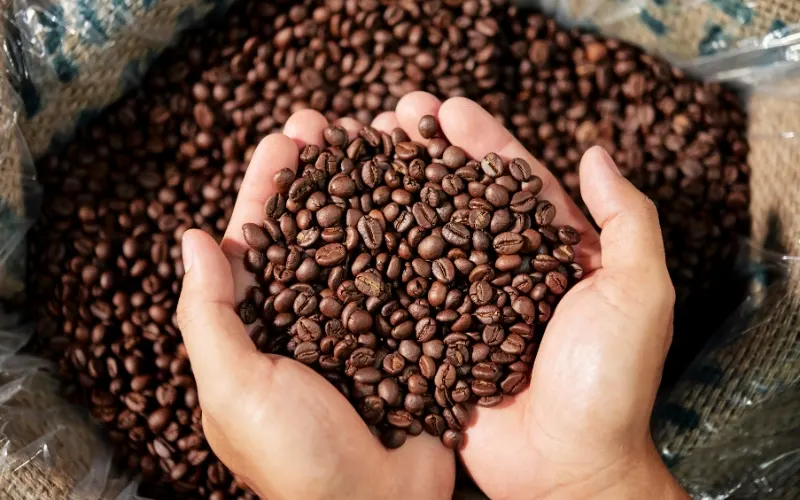
The History of Coffee in Egypt
10 June، 2025
At Ben El Abed, we don’t just serve coffee—we preserve a deep-rooted heritage and history. The history of coffee in Egypt is a long story of art, culture, and enjoyment that began centuries ago and continues to this day. In this article, we’ll take you on a journey through time to discover the story of coffee in Egyptian heritage, and the historic cafés that witnessed key moments in our nation’s history.
The Beginnings of Coffee in Egypt: A Story of Arrival and Spread
Coffee arrived in Egypt in the 16th century, during the Ottoman era, marking the beginning of a love affair that endures to this day. Egypt was a key hub in the coffee trade in the Middle East, and thanks to its strategic location, it played a major role in spreading coffee from Yemen to the rest of the world.
Coffee and Power: Tales from the Mamluk and Ottoman Eras
In the beginning, coffee faced resistance from some religious authorities who considered it intoxicating and forbidden. In 1511, the governor of Mecca banned coffee, and similar attempts were made in Egypt. But the public’s love for coffee prevailed. Ottoman Sultan Selim I issued a fatwa legalizing it, leading to its official spread throughout the Ottoman Empire, including Egypt.
“Coffee in Egypt is not just a drink—it’s part of our identity and history.” – Ben El Abed
Turkish Coffee in Egypt: A Centuries-Old Tradition
Turkish coffee became an essential part of Egyptian culture. Egyptians developed their own unique way of preparing it, adding distinctive touches like cardamom, sometimes cinnamon. Coffee became a staple in key social rituals such as engagements, weddings, and funerals.
Historic Egyptian Cafés: Cultural and Political Hubs
Traditional cafés in Egypt are not just places to drink coffee—they were, and still are, important cultural, social, and political centers. Since the late 16th century, cafés began spreading in Cairo and Alexandria, becoming gathering spots for intellectuals, artists, and political figures.
Famous Cafés of Old Cairo
- El Fishawy Café:Founded in 1773 in the heart of Khan El-Khalili, it was the favorite gathering place of renowned author Naguib Mahfouz. This café witnessed the creation of many of his famous novels and remains a major tourist attraction.
- Riche Café:Established in 1908, it became a hub for Egypt’s nationalist movement and hosted secret meetings of revolutionaries against British occupation.
- El-Alaily Café:One of the most famous cafés in the Al-Hussein district, it was a beloved spot for listening to chanters and traditional musicians.
The Role of Cafés in Egypt’s Cultural Life
Cafés in Egyptian popular culture have played a major role in shaping cultural and political awareness. They served as spaces for exchanging ideas, hearing news, and listening to storytellers and traditional street entertainment. They were also gathering spots for playing traditional games like backgammon, dominoes, and chess.
In modern times, cafés became incubators for Egypt’s literary and artistic movements. Many writers, poets, and artists gathered in cafés like Riche and El-Fishawy to share ideas and create their works.
Coffee in Egyptian Literature: A Cup of Inspiration
Coffee holds a strong presence in Egyptian literature. Many Egyptian authors have written about coffee and cafés in their works, portraying coffee as a symbol of companionship, warmth, and dialogue.
Naguib Mahfouz and Coffee
Naguib Mahfouz, Nobel Prize-winning author, was one of the most renowned patrons of Egyptian cafés. In his novels, especially his famous Cairo Trilogy, he described cafés in rich detail, turning them into key settings for major events. El-Fishawy Café was his favorite writing spot. He once said: “In the café, you find all of Egypt sitting at one table.”
Poems and Songs About Coffee
Coffee is also present in Egyptian poetry and songs. The great poet Salah Jahin once wrote:
“Oh coffee, daughter of beans... perfectly spiced with cardamom and beans With you, my mornings are brighter... and my nights sweeter.”
In popular songs, coffee is a symbol of generosity and hospitality:
“Pour the coffee, make it strong… honor our beloved guests.”
Coffee Drinking Traditions in Egypt: Daily Rituals
Coffee drinking habits in Egypt are rich and varied in detail. Coffee is more than just a drink—it’s a daily ritual with its own customs and rules.
Morning Coffee: The Start of an Egyptian Day
In Egyptian homes, morning coffee is a deeply rooted tradition. “The day starts with a cup of coffee” isn’t just a saying—it’s a fact in most Egyptian households. Coffee is typically served with breakfast—or even before—and is tailored to each family member’s taste.
Afternoon Coffee: A Moment of Relaxation
After lunch, especially in the late afternoon, comes the time for "asari coffee." It’s a moment to relax after a long day, often served with something sweet like basbousa or kunafa.
Evening Coffee: For Companionship and Conversation
During evening gatherings and family get-togethers, coffee plays an essential role. "Evening coffee" is usually lighter, served with desserts and nuts, and is a time for chatting, laughter, and storytelling.
Cup Reading: The Art of Fortune Telling
One of the popular traditions associated with coffee in Egypt is “cup reading.” After drinking Turkish coffee, the cup is turned upside down onto the saucer. Once it cools, the coffee grounds are read as symbols that predict the future.
The Coffee Trade in Old Egypt: A Stop on the Silk Road
In the past, the coffee trade was a vital part of Egypt’s economy. Egypt was a major stop on the coffee route between Yemen and Europe, and the Port of Alexandria was one of the most important coffee-exporting ports in the world.
The Coffee Market in Khan El-Khalili
Khan El-Khalili, Cairo’s most famous historic bazaar, was a key center for the coffee trade. There was a dedicated coffee market where traders imported beans from Yemen and Ethiopia and sold them to local roasters and exporters.
Traditional Coffee Roasters
Traditional roasters—still found today—were located in the old neighborhoods of Cairo and Alexandria. They were small shops equipped with simple tools for roasting and grinding beans. The aroma of roasted coffee would fill the streets, becoming a hallmark of old Egyptian neighborhoods.
Coffee in Egypt Today: Between Tradition and Modernity
Modern Egyptian coffee culture blends heritage with innovation. Traditional cafés still thrive with their authentic charm, while global and local coffee chains have emerged, offering a wide variety of brews.
Modern and Traditional Cafés
Today, Egypt offers a wide range of cafés. From traditional cafés in local neighborhoods to modern coffee shops in malls and upscale areas. Each type offers a unique experience—but coffee remains Egyptians' favorite drink.
Ben El Abed: Preserving Heritage While Innovating
At Ben El Abed, we’re proud to be part of Egypt’s coffee heritage. We honor traditional methods in selecting and roasting beans while utilizing the latest technologies, like hot air roasting, to achieve the best flavor.
We offer a variety of both traditional Egyptian and international coffees, ensuring that each cup delivers a unique experience blending the aroma of history with modern quality.
Frequently Asked Questions About the History of Coffee in Egypt
When did coffee arrive in Egypt?
Coffee arrived in Egypt in the 16th century during Ottoman rule. It came from Yemen via merchants and quickly became popular across Egyptian society.
What are the oldest cafés in Egypt?
El-Fishawy Café in Khan El-Khalili, founded in 1773, is one of Egypt’s oldest historic cafés still in operation. There are also other historic cafés like Riche Café (established in 1908).
How has coffee culture evolved in Egypt?
Egyptian coffee culture has evolved over centuries from a luxury for the elite to a drink enjoyed by all. Cafés evolved from simple coffee spots to important cultural, social, and political hubs. Today, new coffee types and cafés have emerged, but traditional coffee still holds a special place in Egyptians’ hearts.
What role do cafés play in Egypt’s cultural life?
Cafés in Egypt's popular culture have played a major role in shaping cultural and political awareness. They have always been— and still are— meeting places for intellectuals, artists, and politicians, and a platform for literary and philosophical discussions. Many literary and artistic works were born in cafés, and many political and revolutionary movements used them as meeting places.
How was coffee prepared in old Egypt?
Traditional coffee preparation methods in Egypt were simple yet meticulous. The beans were roasted over fire in a copper roaster, then ground in a mortar or manual grinder. Coffee was brewed in a copper cezve (pot) and served in small cups. This method is still used today in many Egyptian households and traditional cafés.
In Conclusion…
The history of coffee in Egypt is a vital part of the nation’s heritage and culture. Coffee is more than a beverage—it’s a long-standing story of art, culture, and enjoyment that began centuries ago and continues today.
At Ben El Abed, we’re proud to be part of this story. We strive to preserve the authentic heritage of Egyptian coffee while delivering a modern experience that suits today’s tastes.
Visit your nearest Ben El Abed branch and enjoy a truly authentic coffee experience that tells the story of Egypt in every sip.
Ben El Abed... A Legacy of Authenticity in Every Cup
Enjoyed this article? Share it with your fellow coffee lovers, and follow us on social media for more insights and tips from the coffee world.
Explore Our Coffee Collection | Chat with Our Coffee Experts | Talk to Our Coffee Experts





